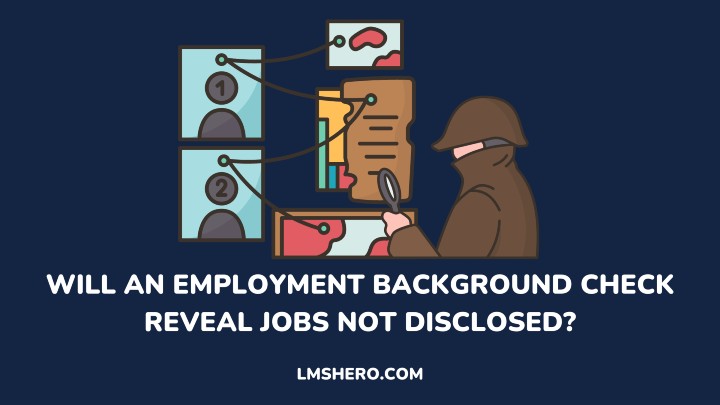Yes, a thorough employment background check will reveal jobs not disclosed on your CV.
A background check might also show if you were concealing or failing to mention any shady jobs or criminal past.
This article explores the criteria needed to pass an employment background check and how they reveal jobs not disclosed.
What is an employment background check?
A background check refers to the examination of a person’s historical record to collect their criminal, financial, and professional records during an employment phase.

When businesses hire people for positions of trust, they frequently conduct background checks to ensure they are selecting the best candidates.
Why does an employment background check reveal jobs not disclosed?
Despite the fact that it is impossible for a background check to produce a list or database of the positions a professional has had over the years.
The majority of pre-employment background check services are designed to find information from public databases including credit history, driving records, and criminal histories.
Some background checks reveal undisclosed jobs because some employers do request a thorough job history. The major question is how it will impact your work prospects. Hence, it is possible to uncover a disappointing career history if a thorough background check is conducted.
You won’t be affected in any way if your previous employment is unrelated to your current job prospect. However, you will be disqualified if you hid that job history because you committed fraud or any other misconduct, and they discovered it afterward.
However, the majority of employers base their decision on the details you supplied in the interview and on your CV. This implies that the data you supply to the background check agency will most times be used to conduct all background checks.
How an employment background check works
Employment background checks are conducted by assessing the following criteria.
1. Work history verification
Your prospective employer may speak to your former employer with your permission. To confirm the dates you worked and the roles you held, they will get in touch with the employers stated on your CV or application.
Additionally, to assess performance and character, they might also get in touch with the references you gave them.
2. Criminal history assessment
Your prospective employers may contact state, local, and federal agencies for criminal histories. However, the Fair Credit Reporting Act and several states limit the reporting of crimes that happened more than 7 years ago unless some exceptions are met.
How far back your prospective employers go is controlled by the state or the FCRA.
3. Educational background verification
Your employer will get in touch with the educational or licensing institutions you’ve indicated to confirm your course of study and degrees achieved, just like they would to confirm previous work.
If your prospective employer determines that your professional licenses are required for the work, they will also check to make sure they are all current.
4. Driving history assessment
If your job requires you to drive, whether it be a business car, delivery vehicle, or long-haul truck, your prospective employer will probably verify your driving history (MVR). They will need to do this in order to ensure you are not a reckless driver.
What does an employment background check show?
Employment background checks can cover your employment background, credit history, driving records, and criminal history.
1. Criminal history
Businesses must give their employees a safe place to work. Many people think that maintaining a safe workplace depends on doing criminal background checks as part of an employment screening.
However, merely having a felony conviction on your record does not guarantee that you will not be hired.
Additionally, if two applicants have prior criminal records but different racial origins, the employer cannot reject one candidate while hiring the other. Discrimination of this kind contravenes EEOC regulations.
2. Credit history
A corporation may check your credit during background checks for a variety of reasons. The most common justification is that your credit records can show how responsible and trustworthy you are.
If you’re seeking a position that includes handling money, the credit history will let the employer know if, after the employment screening, employing you would pose a financial risk.
These credit checks don’t include your credit ratings, but they do reveal if you’ve made on-time payments. They might also include information about your previous addresses and employers.
3. Employment history
You must always be absolutely truthful when applying for jobs and avoid telling even the slightest lie on your resume. This is because the findings of a background check may frustrate your job opportunity.
Extending employment dates to fill in a gap is one of the most typical CV lies. It is best to do some research rather than speculating if you need assistance recalling the precise dates.
Dates on your resume should be written in the mm/yyyy format. This is because that is what an applicant tracking system (ATS) scan will check for.
As a result of a background check, a company can find out when you were employed. They can also discover what your previous positions were, and even why you left them.
4. Driving records
Whenever a job role involves using company vehicles, your employers are responsible for you. Since driving is among the responsibilities involved, employers will check your driving history.
If they put you in one of their cars, they want to know you will be a responsible driver with a spotless record. Additionally, a worker with a reckless driving tendency may raise insurance costs for the business.
FAQs
Why do employers use background checks?
Simply said, background checks are conducted by employers to ensure that you are qualified for the position. Employers merely want to make sure you don’t pose a threat to the company and to confirm the facts you’ve already provided.
What kinds of jobs do not require a background check?
Jobs that do not require an immediate background check from employers include construction jobs, landscaping, babysitting, farming, house cleaning, freelance writing, and pet grooming jobs.
Does an employment background check go through your social media?
Background checks often don’t reveal social media accounts. The majority of background checks include information on credit history, legal issues, and job history.
Conclusion
While most employment background checks have no business with hidden job histories, some employers conduct full background checks for security reasons.
Examples of employers that may require a thorough background check include defense contractors or top financial institutions. This is because they want to make sure you do not pose a risk to the organization.
As long as you have no history of fraud or criminal activity in those undisclosed jobs, most employers would pay no attention to them.
I hope you found this article helpful. Here’s all you need to know about employee onboarding that can make your recruitment process easier.
Thanks for reading.







